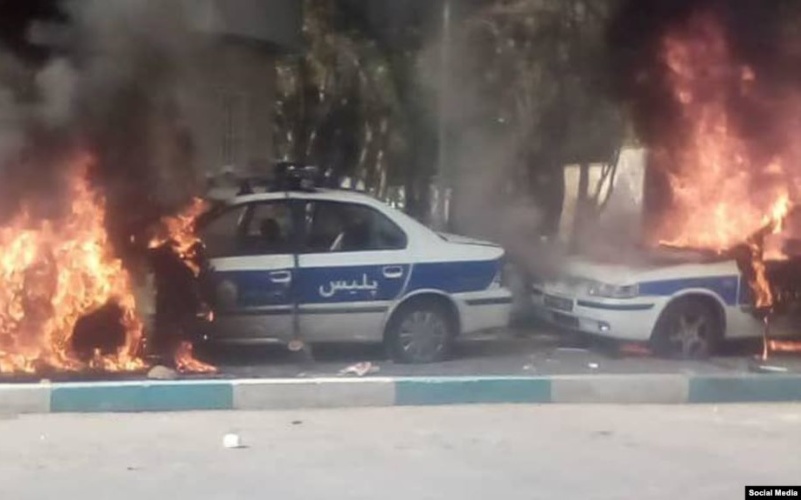Police cars set on fire in Shiraz, Iran, November 16. 2019
Despite regime claims that mass protests in Iran have been dispersed, Friday Prayer leaders and a military commander have displayed their concerns.
Prayer leaders in Iran’s largest cities, who follow guidelines set by the Supreme Leader’s office, called on the Government to maintain a cut-off of the Internet.
The block was imposed last weekend as protests spread over a Government announcement of a 50% rise in the cost of subsidized petrol. More than 100 people, most of them protesters, have been killed. Officials say more than 1,000 were arrested, with scores of banks and government buildings burnt.
President Hassan Rouhani declared Wednesday, “We defeated armed anarchists”, but Tehran Friday Prayer leader Ayatollah Ahmad Khatami assailed Rouhani for “shocking the people”: “The Rouhani administration could have handled the gas price hike more efficiently to prevent the unrest.”
Khatami reinforced the claims of officials, including the Supreme Leader, that the US, Saudi Arabia, and France instigated violence: “The enemies have been planning the protest for three years.”
But while praising the suppression of the protests, he warned that the threat was not over: “Please do not unblock the internet! You saw that it teaches the people how to commit crimes.”
Telecommunications minister Mohammad Javad Azari Jahromi said Internet access has been allowed in some areas, and the Revolutionary Guards’ Fars News, citing an unnamed source, said the National Security Council had approved activation with “fixed line internet has been restored in Hormuzgan, Kermanshah, Arak, Mashhad, Qom, Tabriz, Hamadan and Bushehr provinces, and parts of Tehran”.
But NetBlocks said Iran’s connectivity was only 14% at midday on Friday.
Protecting the Supreme Leader
In Iran’s second city Mashhad, Ayatollah Ahmad Alamolhoda echoed Khatami’s call for the block on social media sites and applications and the criticism of the Rouhani administration for “shocking the people”.
The denunciation of the Government is an attempt to cover the Supreme Leader’s role in the reduction of the petrol subsidies, which had been rumored for months. The decision was taken by an “Economic War Council” appointed by Khamenei — Rouhani, Parliament Speaker Ali Larijani, and judiciary head Ebrahim Raisi — in the face of comprehensive US sanctions.
Alamolhoda’s criticism contradicts what Khamenei has admitted that he knew about the decision and approved it. This means raising gasoline prices was not a Rouhani administration decision. It was a collective move approved by all top leaders.
Amid the protests, the Supreme Leader has said the Government should ensure that costs of other goods do not increase sharply. Alamolhoda pointed to shopkeepers who increased prices, and called out bakers who have made gbread loaves smaller following the rise in the price of gasoline.
“Ringleaders Arrested”
Portraying the defeat of the protests, the judiciary announced on Friday that 100 “ringleaders” had been arrested by the Revolutionary Guards.
Spokesman Gholam-Hossein Esmaili proclaimed that “calm [has been] restored to the country under Leader of the Islamic Revolution Ayatollah Seyyed Ali Khamenei’s directions”.
The deputy commander-in-chief of the Guards, Brig. Gen. Ali Faadvi, asserted, “The Americans have gone mad that the riots were over within 48 hours and are disappointed that there is no more disorder in Iran.”
But Brig. Gen. Salar Abnoush, a commander of the Basij paramilitary force, said the ending of the protests was a “miracle”.
Abnoush said at a Friday ceremony in western Iran, “Strange coordinations were made in the recent sedition. They were only waiting for one spark to destroy the country.”
He claimed that “the seditionists who intended to massacre half of the Iranians” were backed by the US, Israel, and Saudi Arabia and had adanced equipmen.
Abnoush said interrogations had revealed a “coalition of evil” made up of “Zionists, America and Saudi Arabia” was behind the “sedition”.
On Thursday, he proclaimed, “A full-fledged world war against the system and the revolution was born and fortunately the child died at the moment of birth.”
Yesterday he gave a muddled explanation of the petrol price rise, which only tied the Supreme Leader to the decision that sparked anger:
There are some who are upset by the Supreme Leader’s defense of the increase in gasoline prices….Without his expedient measures, the wishes of the seditionists would be fulfilled because — according to their calculations — in order to defend the underprivileged classes of the society, the Supreme Leader would oppose the move.

